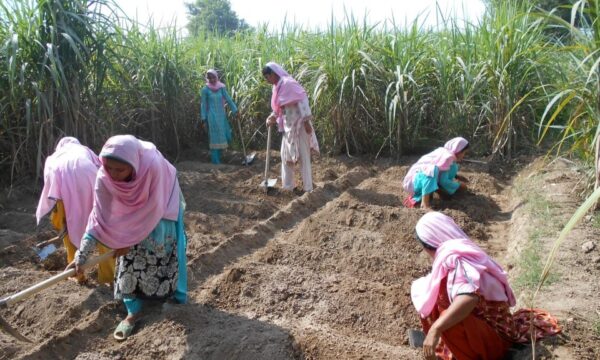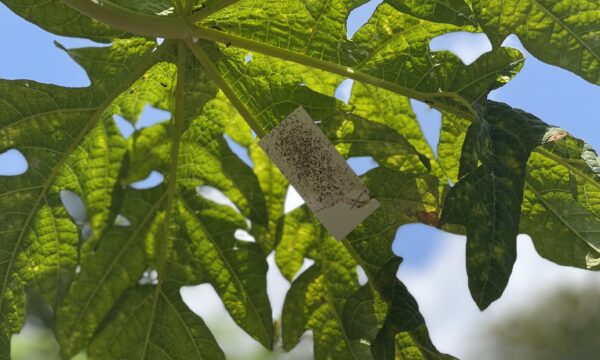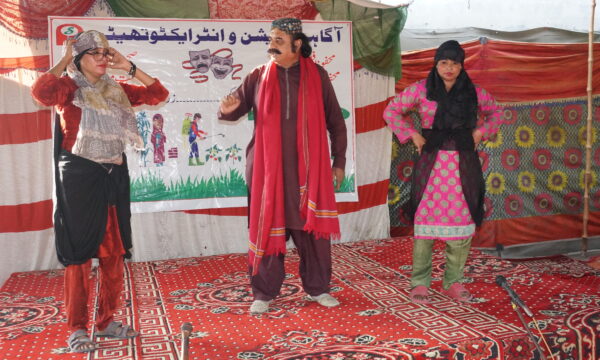
Sihle Nakombe is a lab technician from CABI’s office in Zambia. She joined CABI in January 2023. Earlier this year, she visited the CABI labs in Egham, UK, to get training on Metarhizium. This naturally occurring fungus can control insect pests with low environmental and human health effects.
Sihle grew up in Mazabuka, a small town in the Southern Province of Zambia. Mazabuka is known for producing sugar branded as Zambia Sugar, the largest sugar manufacturing company in Zambia. She holds a bachelor’s degree in microbiology from The University of Zambia. During this time, Sihle became involved in a Stirring Steam for Science Technology Engineering Mathematics and with the Zambian Women in Agriculture Research and Development organisation.
Participating in various activities during university opened Sihle’s mind to the different aspects of agriculture. Sihle’s focus at CABI is on the biological control of pests affecting small-scale farmers in Zambia, using fungus and natural enemies. In the future, Sihle hopes to further her research in integrated pest management (IPM) using biological control.
Here, we learn more about Sihle and her work on Metarhizium
What is Metarhizium?
Metarhizium is a genus of entomopathogenic fungi Clavicipitaca. Metarhizium is a naturally occurring fungus that can control insect pests with low environmental and human health effects. The fungus can be very host-specific, meaning it does not harm other organisms, such as insects, animals and humans.
What are you learning about Metarhizium at CABI’s labs in Egham?
My learning focused on the mass production of Metarhizium rileyi and some laboratory techniques such as germination tests, hemocytometer count and contamination tests.
Why is research on Metarhizium important for the work of PlantwisePlus?
Within CABI PlantwisePlus, we aim to reduce the use of highly hazardous pesticides. One way we are doing this is by promoting the use of biological control. Metarhizium is one biological control product used worldwide to control various insect pests. It can be produced in large quantities artificially, making it suitable to be developed into a commercial product.
Moreover, it has low environmental and human health effects. And insects do not build up resistance to it. Within PlantwisePlus, we aim to support developing countries to produce their own biological control so that subsistence farmers can afford to use them.
How is Metarhizium used in the field?
We are currently working on how it can be used in the field by producing the best formulation from the lab and then to the field. Metarhizium can be applied in the same way sprayers apply chemical pesticides.
In addition to this, Metarhizium can also be applied as a powder. In Zambia, we are looking at using a basic formulation of sand and fungus to apply to the whorls of the maize plants, as this is where the invasive fall armyworm (Spodoptera frugiperda) can be found, along with sprayable formulations.
Can Metarhizium be used to address pests and diseases?
Yes, it can be used to address pests and diseases. Metarhizium is naturally found in some parts of Zambia and is known to kill fall armyworm. As this particular fungus is a native strain, it is naturally adapted to the environmental conditions of Zambia, making it a potential successful biocontrol product. Although, Metarhizium is an insect pathogen and generally does not control diseases.
What motivated you to work in science and development?
I have always had a great passion for science since an early age. As I grew older, the problems affecting the economy in Zambia were apparent. I, therefore, wanted to work in science and development to bring change and innovative technologies to address these problems. Not just in Zambia, but also in vulnerable nations across the globe.
What does a typical day look like in the lab?
A typical day in the lab begins with disinfecting the surfaces. Then, I carry out bioassays for the fungus and virus if needed. My focus then turns to conducting some quality control tests with fungus, checking on the rearing of fall armyworm and ttomato leafminer (Phthorimaea absoluta). The laboratory apparatus and the environment I work in must always be clean.
What do you like most about working for CABI?
Working at CABI has enabled me to improve my capacity-building skills, strengthening and developing my skillset to thrive in a fast-changing world. As well as this, my laboratory skills have been further developed, allowing me to enhance my understanding of the biological control of insect pests. Moreover, I have further increased my experience working with farmers, which is a necessary skill to provoke change at a grassroots level.
What areas of future research do you wish to investigate?
I wish to investigate the biological control of insects further to help suppress the population of pests to make them less damaging. Furthermore, I would love to broaden my understanding of the PlantwisePlus programme to support small-scale farmers using fewer pesticides to control pests.
Find out more
Village-based biological control of fall armyworm in Zambia
Green Muscle providing strength against devastating locusts in the horn of Africa
Metarhizium flavoviride (biocontrol of locusts)
Digital extension campaign boosts farmers’ knowledge and capacity to manage fall armyworm in Zambia
Conservation farming: can it offset fall armyworm’s impact?
PlantwisePlus is financially supported by the Directorate-General for International Cooperation (DGIS), Netherlands; European Commission Directorate General for International Partnerships (INTPA, EU); the Foreign, Commonwealth & Development Office (FCDO), United Kingdom; the Swiss Agency for Development and Cooperation (SDC); the Australian Centre for International Agricultural Research (ACIAR); the Ministry of Agriculture of the People’s Republic of China (MARA)
Related News & Blogs
“Use of any pesticide comes with some risk, but this risk can be reduced”
Pesticides are a widely used pest management option. However, if applied incorrectly, they can pose serious risks to human health, ecosystems, and food safety. From farm workers and consumers to pollinators and waterways, the impacts of unsafe pesticid…
30 June 2025




